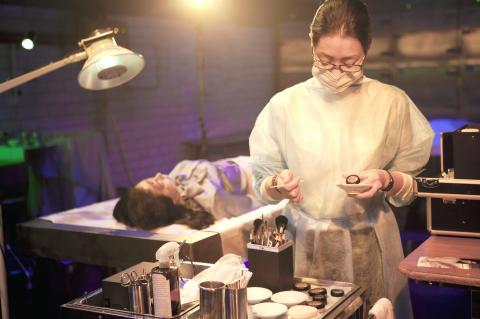Director Lien Yi-chi (連奕琦) takes on lesbian love and death in his debut feature Make Up (命運化妝師). Boasting exquisite cinematography and solid acting from a well-chosen cast, the slickly produced movie is a competent stab at a genre that is rarely tackled in Taiwanese cinema, but a flawed script lets the project down.
Promising young actress Nikki Hsieh (謝欣穎) plays Min-hsiu, a mortuary beautician who prefers the company of the dead to that of the living. Her quiet life is disrupted when the cosmetologist discovers that her new assignment is working on the body of her former high school teacher, Chen Ting (Sonia Sui, 隋棠), who is believed to have committed suicide. Through a series of flashbacks, we quickly learn that Ming-hsiu had a lesbian romance with Chen during her teen years.
Heartbroken by his wife’s death, affluent psychiatrist Nie (Matt Wu, 吳中天) approaches Min-hsiu in the hope of discovering more about Chen’s past. Meanwhile, detective Kuo (Ray Chang, 張睿家) seeks the beautician’s help in investigating the death.

Photo Courtesy of Good Day Films
As she delves into the truth behind her ex-lover’s self-destruction, Min-hsiu gradually unearths the secrets and inner demons that haunt not only Nie and Kuo, but herself as well.
Despite the looks of a thriller, the film is more of a study on the dark side of human nature than a mystery-solving exercise.
The challenge is partially met by the well-cast actors, who carry the narrative forward without falling foul of melodramatic cliche. One example is Wu, who, after years of struggling with poorly written roles, finally plays a flesh and blood character. He shows that he is capable of delivering expressive cadences and nuanced emotions as a man tortured by love. Another pleasant surprise is model-turned-actress Sui, who illuminates her character with a gripping fragility and a sense of despair, and whose debut performance on the silver screen is marked by restraint.
As forceful and telling as the actors are, the atmospheric cinematography by Canada-educated Randy Che (車亮逸) weaves together a delicate play of light and shadow, accentuating moods and emotions with a kaleidoscope of tones and luminosities.
The film’s obvious failing lies in its underdeveloped script, which lacks adequate detail to fully develop the characters. For example, the taboo love between Chen and Min-hsiu doesn’t come across as intense enough. Similarly, more screen time is needed to explain the psychiatrist’s transformation from a loving husband to a lost soul.
After female director Cho Li’s (卓立) unsuccessful mystery thriller Zoom Hunting (獵豔) last year, Make Up is a more polished effort and one step closer to a well-narrated story that audiences can empathize with.

On April 26, The Lancet published a letter from two doctors at Taichung-based China Medical University Hospital (CMUH) warning that “Taiwan’s Health Care System is on the Brink of Collapse.” The authors said that “Years of policy inaction and mismanagement of resources have led to the National Health Insurance system operating under unsustainable conditions.” The pushback was immediate. Errors in the paper were quickly identified and publicized, to discredit the authors (the hospital apologized). CNA reported that CMUH said the letter described Taiwan in 2021 as having 62 nurses per 10,000 people, when the correct number was 78 nurses per 10,000

As Donald Trump’s executive order in March led to the shuttering of Voice of America (VOA) — the global broadcaster whose roots date back to the fight against Nazi propaganda — he quickly attracted support from figures not used to aligning themselves with any US administration. Trump had ordered the US Agency for Global Media, the federal agency that funds VOA and other groups promoting independent journalism overseas, to be “eliminated to the maximum extent consistent with applicable law.” The decision suddenly halted programming in 49 languages to more than 425 million people. In Moscow, Margarita Simonyan, the hardline editor-in-chief of the

Six weeks before I embarked on a research mission in Kyoto, I was sitting alone at a bar counter in Melbourne. Next to me, a woman was bragging loudly to a friend: She, too, was heading to Kyoto, I quickly discerned. Except her trip was in four months. And she’d just pulled an all-nighter booking restaurant reservations. As I snooped on the conversation, I broke out in a sweat, panicking because I’d yet to secure a single table. Then I remembered: Eating well in Japan is absolutely not something to lose sleep over. It’s true that the best-known institutions book up faster

Though the total area of Penghu isn’t that large, exploring all of it — including its numerous outlying islands — could easily take a couple of weeks. The most remote township accessible by road from Magong City (馬公市) is Siyu (西嶼鄉), and this place alone deserves at least two days to fully appreciate. Whether it’s beaches, architecture, museums, snacks, sunrises or sunsets that attract you, Siyu has something for everyone. Though only 5km from Magong by sea, no ferry service currently exists and it must be reached by a long circuitous route around the main island of Penghu, with the